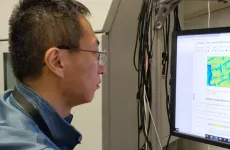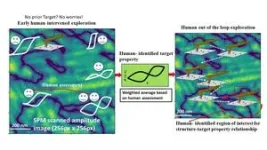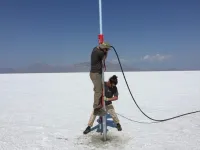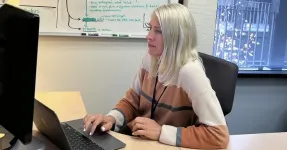(Press-News.org) Though artificial intelligence decreases human error in experimentation, human experts outperform AI when identifying causation or working with small data sets.
To capitalize on AI and researcher strengths, ORNL scientists, in collaboration with colleagues at National Cheng Kung University, Taiwan, and the University of Tennessee, Knoxville, developed a human-AI collaboration recommender system for improved experimentation performance.
During experiments, the system’s machine learning algorithms, described in npj Computational Materials, display preliminary observations for human review. Researchers vote on data, telling the AI to show similar information or change direction, akin to a streaming service generating suggested content based on users’ activity. After initial guidance, algorithms improve to illuminate relevant data with little human input.
“The foundation of this research is basically not the quantity of the data but the quality of the data that we are aiming for,” ORNL’s Arpan Biswas said.
The experiments and autonomous workflows were supported by the DOE-funded Center for Nanophase Materials Sciences, and algorithm development was supported by the DOE-funded MLExchange project to expand machine learning development at national laboratories.
END
Human-AI coworking
New system combines human, artificial intelligence to improve experimentation
2024-02-21
ELSE PRESS RELEASES FROM THIS DATE:
Vlasov and Bashir groups develop nanoscale device for brain chemistry analysis
2024-02-21
Longstanding challenges in biomedical research such as monitoring brain chemistry and tracking the spread of drugs through the body require much smaller and more precise sensors. A new nanoscale sensor that can monitor areas 1,000 times smaller than current technology and can track subtle changes in the chemical content of biological tissue with sub-second resolution, greatly outperforming standard technologies.
The device, developed by researchers at the University of Illinois Urbana-Champaign, is silicon-based and takes advantage of techniques developed for microelectronics manufacturing. ...
MD Anderson researchers receive over $25.5 million in CPRIT funding
2024-02-21
HOUSTON ― The University of Texas MD Anderson Cancer Center today was awarded 16 grants totaling over $25.5 million from the Cancer Prevention and Research Institute of Texas (CPRIT) in support of cancer screening, early detection and prevention programs, faculty recruitment, and groundbreaking cancer research across all areas of the institution.
“We are grateful for CPRIT’s continued funding of impactful cancer research and prevention programs at MD Anderson, which propels our efforts to deliver new breakthroughs and to advance our mission to end cancer,” said Peter WT Pisters, M.D., president of MD Anderson. “These efforts are pivotal to our institutional strategy ...
Hippo signaling pathway gives new insight into systemic sclerosis
2024-02-21
Systemic sclerosis causes the skin to tighten and harden resulting in a potentially fatal autoimmune condition that is associated with lung fibrosis and kidney disease.
University of Michigan Health researchers have studied the pathology of systemic sclerosis to understand better the disease and identify key pathways in the disease process that can be targeted therapeutically.
A research team led by University of Michigan Health’s Dinesh Khanna, M.B.B.S., M.Sc., professor of rheumatology and Johann Gudjonsson, M.D., Ph.D., professor of dermatology, ...
Utah’s Bonneville Salt Flats has long been in flux
2024-02-21
It has been long assumed that Utah’s Bonneville Salt Flats was formed as its ancient namesake lake dried up 13,000 years ago. But new research from the University of Utah has gutted that narrative, determining these crusts did not form until several thousand years after Lake Bonneville disappeared, which could have important implications for managing this feature that has been shrinking for decades to the dismay of the racing community and others who revere the saline pan 100 miles west of Salt ...
UM School of Medicine receives $10.6 million in state funding for Abortion Clinical Care Training Program
2024-02-21
A $10.6 million training grant has been awarded to the University of Maryland School of Medicine (UMSOM) and University of Maryland, Baltimore (UMB) to administer Maryland’s Abortion Clinical Care Training Program. The grant will be used to expand the number of healthcare professionals with abortion care training, increase the racial and ethnic diversity among health care professionals with abortion care education, and support the identification of clinical sites needing training.
“Our training will target a major ...
Outsmarting chemo-resistant ovarian cancer
2024-02-21
· Most women with ovarian cancer develop resistance to chemotherapy
· Nanoparticle fools cancer cells and prevents cholesterol from entering
· More than 18,000 women a year die from ovarian cancer
CHICAGO --- Women diagnosed with ovarian cancer may initially respond well to chemotherapy, but the majority of them will develop resistance to treatment and die from the disease.
Now Northwestern Medicine scientists have discovered the Achilles heel of chemotherapy-resistant ovarian cancer — its hunger for cholesterol — and how to sneakily use that to destroy it.
In a new study, scientists first showed that chemotherapy-resistant ...
Does Russia stand to benefit from climate change?
2024-02-21
“There’s a narrative out there about climate change that says there are winners and losers. Even if most of the planet might lose from the changing climate, certain industries and countries stand to benefit. And Russia is usually at the tip of people’s tongues, with Russian officials even making the claim that Russia is a potential winner.”
This portrayal, described by Debra Javeline, associate professor of political science at the University of Notre Dame and lead author on the recently published study “Russia in a changing climate,” was debated ...
Researchers find possible solutions to reverse Alzheimer’s Disease impact
2024-02-21
University of North Carolina at Chapel Hill researchers have developed a new drug delivery platform that harnesses helical amyloid fibers designed to untwist and release drugs in response to body temperatures.
A new research paper published on Jan. 26 in Nature Communications reveals groundbreaking structural details into how diseases form much like Alzheimer’s disease. With this knowledge, the group may have uncovered a unique mechanism to reverse both the deposits and their impact on those suffering from these conditions.
UNC-Chapel Hill researcher Ronit Freeman ...
A Mount Sinai-led study shows early success of a novel drug in treating a rare and chronic blood cancer
2024-02-21
New York, NY (February 21, 2024) – A novel treatment for polycythemia vera, a potentially fatal blood cancer, demonstrated the ability to control overproduction of red blood cells, the hallmark of this malignancy and many of its debilitating symptoms in a multi-center clinical trial led by the Icahn School of Medicine at Mount Sinai.
In the phase 2 study, the drug rusfertide limited excess production of red blood cells, the main manifestation of polycythemia vera, over the 28-week course of ...
Muscle as a heart-health predictor
2024-02-21
Body composition — often expressed as the amount of fat in relation to muscle — is one of the standard predictors of cardiac health. Now, new research from the University of California San Diego indicates more muscle doesn’t automatically mean lower risk of heart trouble.
The study, published in the Journal of the American Heart Association, found all muscle isn’t the same. Britta Larsen, PhD, says men with a higher area of abdominal muscle have a greater risk of cardiac trouble. It’s a completely different ...
LAST 30 PRESS RELEASES:
One strategy to block both drug-resistant bacteria and influenza: new broad-spectrum infection prevention approach validated
Survey: 3 in 4 skip physical therapy homework, stunting progress
College students who spend hours on social media are more likely to be lonely – national US study
Evidence behind intermittent fasting for weight loss fails to match hype
How AI tools like DeepSeek are transforming emotional and mental health care of Chinese youth
Study finds link between sugary drinks and anxiety in young people
Scientists show how to predict world’s deadly scorpion hotspots
ASU researchers to lead AAAS panel on water insecurity in the United States
ASU professor Anne Stone to present at AAAS Conference in Phoenix on ancient origins of modern disease
Proposals for exploring viruses and skin as the next experimental quantum frontiers share US$30,000 science award
ASU researchers showcase scalable tech solutions for older adults living alone with cognitive decline at AAAS 2026
Scientists identify smooth regional trends in fruit fly survival strategies
Antipathy toward snakes? Your parents likely talked you into that at an early age
Sylvester Cancer Tip Sheet for Feb. 2026
Online exposure to medical misinformation concentrated among older adults
Telehealth improves access to genetic services for adult survivors of childhood cancers
Outdated mortality benchmarks risk missing early signs of famine and delay recognizing mass starvation
Newly discovered bacterium converts carbon dioxide into chemicals using electricity
Flipping and reversing mini-proteins could improve disease treatment
Scientists reveal major hidden source of atmospheric nitrogen pollution in fragile lake basin
Biochar emerges as a powerful tool for soil carbon neutrality and climate mitigation
Tiny cell messengers show big promise for safer protein and gene delivery
AMS releases statement regarding the decision to rescind EPA’s 2009 Endangerment Finding
Parents’ alcohol and drug use influences their children’s consumption, research shows
Modular assembly of chiral nitrogen-bridged rings achieved by palladium-catalyzed diastereoselective and enantioselective cascade cyclization reactions
Promoting civic engagement
AMS Science Preview: Hurricane slowdown, school snow days
Deforestation in the Amazon raises the surface temperature by 3 °C during the dry season
Model more accurately maps the impact of frost on corn crops
How did humans develop sharp vision? Lab-grown retinas show likely answer
[Press-News.org] Human-AI coworkingNew system combines human, artificial intelligence to improve experimentation





